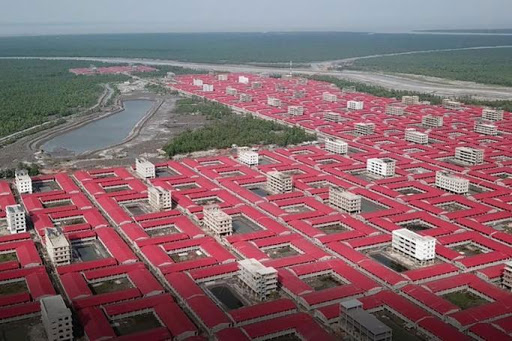DHAKA, Aug 24, 2020 (BSS) – Bangladesh welcomes resettlement idea of displaced Rohingyas to a group of countries as an alternative to transfer the Myanmar origin people to Bhashan Char where Bangladesh already invested hugely to accommodate one lakh of Rakhine exiles.
“If a group of countries can jointly offer to take over half a million Rohingyas in a time span of 1-2 years, we may consider examining it,” foreign secretary Masud Bin Momen said today.
He said Dhaka is planning to start initial transfer of Rohingyas from crowded Cox’s Bazar camps to Bhashan Char, an island 37 miles off the mainland under the administrative jurisdiction of Hatiya upazila, after the Monsoon season.
Bin Masud said Bangladesh has invested hundreds of millions of dollars on infrastructural development of the island that showed its durability and quality of the structures built during the recent severe cyclone Amphan.
“Detractors should now stop their propaganda on Bhasanchar and examine how to relieve pressure off from the highly congested Cox’s Bazar area where locals are outnumbered at a ratio of 2:1,” he added.
He was addressing a webinar titled ‘The Rohingya Crisis: Western, Asian and Bilateral Perspectives’, organised by the North South University here marking third year completion of the latest influx of Rohingyas of Myanmar to Bangladesh.
Mentioning that 306 Rohingyas those were rescued in the Bay of Bengal recently and took shelter in Bashan char are doing well, Bin Masud said Dhaka will soon facilitate a ‘go-and-see’ visit for relatives of sheltered Rohingyas and other representatives to the island.
“If they (Rohingyas) find the place better than the cramped camps in Cox’s bazar, we expect to commence initial transfer of Rohingyas there after the Monsoon season,” he said.
He said the number of local populations in Cox’s Bazar, Ukhia and Tekhnaf is about 570,000 whereas the temporary sheltered Rohingya is the double of host communities while Bangladesh has sacrificed over 6,800 acre of forest land to host the displaced Rohingyas from Myanmar.
Bin Masud said Bangladesh is ready to arrange visit for the UN team, human rights workers and media people to the island to see the compliance and facilities those were made available for the displaced Rohingyas there.
Since 25 August 2017, Bangladesh is hosting over 1.1 million forcefully displaced Rohingyas in Cox’s Bazar district and most of them arrived there after a military crackdown by Myanmar, which the UN called a “textbook example of ethnic cleansing” and other rights groups dubbed as “genocide”.
In the last three years, not a single Rohingya went back home yet although Myanmar agreed to take them back.
Bin Masud said Rohingyas have taken refuge in Bangladesh to flee atrocities while Dhaka has opened her door so that their lives are safe temporarily, “But, they (Rohingyas) must go back to their country of origin,” he added.
Bin Masud said Bangladesh tried repatriation twice but failed as Rohingyas do not feel comfortable in the prevailing condition, which do not make returnees convinced of the sincerity of the Myanmar authorities and also of the majority community- Buddhists of Rakhine.
He said currently Bangladesh is being involved in bilateral, regional and multilateral diplomacies along with accountability and justice front for resolving the crisis through safe, dignified and volunteer repatriation of the displaced Rohingyas to Myanmar.
He said Bangladesh would certainly not prefer investments which will directly or indirectly prolong the refugee situation and create greater and newer pull factors for remaining Rohingyas inside Rakhine. “Bangladesh government rejects any notion of local integration,” he said.
The foreign secretary said Dhaka expects international partners to come forward to convince Myanmar to change course and to play their roles as agreed with Myanmar as per the signed Framework Arrangement.
“We would expect interested partners to talk to Myanmar government and make such long-term investments on health, education, livelihood, connectivity for Rohingyas in northern Rakhine. So far, we discern no such efforts for remaining Rohingyas inside Rakhine,” he said.
Rohingyas are the victims of a culture of persecution from Myanmar, the country that maintained a culture of atrocities against them, to destroy them as a community.
“Solution to the crisis must be found in Rakhine and in Myanmar …. this is Myanmar’s internal problem. The solution must therefore be sought inside Myanmar,” he said.
The foreign secretary said the international community should make sincere and greater efforts to secure conditions for Rohingyas to return to Myanmar and reintegrate into Myanmar society, with a clear pathway to citizenship.
“As we mark three years of forcible displacement of majority of Rohingya from their places of origin, these should be our pledge to the community that was subjected to well-planned machinations to destroy their identity,” he said.
Former foreign minister of Malaysia Dr. Syed Hamid Albar, US Ambassador to Bangladesh Earl R. Miller, High Commissioner of Canada to Bangladesh Benoit Pre´fontaine and Senior Fellow of South Asian Institute of Policy and Governance (SIPG), NSU Md Shahidul Haque also spoke at the event.
Albar said ASEAN, in which Myanmar is also a member, has not taken any meaningful step as there is a high level of tolerance and unwillingness to discuss the Rohingya crisis.
Miller said his country would continue to press Burma, now Myanmar, to stop institutional persecution against minority communities.
Préfontaine stressed the need for ensuring accountability in Myanmar for crimes committed against Rohingya people as well strengthening accountability efforts by the international community with, among others, sending UN Security Council referral to the International Criminal Court and the International Court of Justice.



